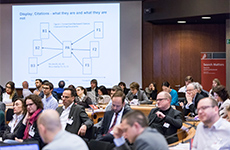The transfer and sharing of knowledge are key features of Europe's knowledge-based economy, which also benefits the stakeholders of the European patent system, such as patent applicants and the examiners of the EPO.
 The Office last year
continued to invest in providing training for its some 7 000 staff. The EPO
Talent Academy, for example, delivers a formal training programme
for newly recruited examiners. In 2018, patent examiners alone spent over
50 days in the classroom or on our e-learning platform, as well as being
mentored one-to-one as they learn on the job. In total, EPO staff recorded 174
000 hours of training last year, including a 155% increase in the number of hours
spent on e-learning.
The Office last year
continued to invest in providing training for its some 7 000 staff. The EPO
Talent Academy, for example, delivers a formal training programme
for newly recruited examiners. In 2018, patent examiners alone spent over
50 days in the classroom or on our e-learning platform, as well as being
mentored one-to-one as they learn on the job. In total, EPO staff recorded 174
000 hours of training last year, including a 155% increase in the number of hours
spent on e-learning.
 The high level of knowledge transfer is also
extended to external stakeholders. The EPO shares its expertise with users
and facilitates knowledge dissemination among them. We have made it a priority
to give the public access to the databases, resources, tools and learning
opportunities needed to develop informed patent strategies. During 2018 we
launched a beta version of
Espacenet, adding multi-platform functionality and a number of new features
to its user-friendly interface. Anyone seeking patent information can now
search over 110 million records from some 100 patent authorities around the
world. Thanks to the new Espacenet, inventors and businesses will easily be
able to find and leverage patent information that helps them monitor emerging
technologies, discover solutions to technical problems and keep pace with
competitor developments.
The high level of knowledge transfer is also
extended to external stakeholders. The EPO shares its expertise with users
and facilitates knowledge dissemination among them. We have made it a priority
to give the public access to the databases, resources, tools and learning
opportunities needed to develop informed patent strategies. During 2018 we
launched a beta version of
Espacenet, adding multi-platform functionality and a number of new features
to its user-friendly interface. Anyone seeking patent information can now
search over 110 million records from some 100 patent authorities around the
world. Thanks to the new Espacenet, inventors and businesses will easily be
able to find and leverage patent information that helps them monitor emerging
technologies, discover solutions to technical problems and keep pace with
competitor developments.
 In this context, the
European
Patent Academy plays an integral part in training institutional,
professional, judicial, academic and business audiences. Our academy offers
multiple platforms, each tailored to meet specific learning outcomes. Last
year, for example, we hosted seventeen training events that often drew over 400
participants each.
In this context, the
European
Patent Academy plays an integral part in training institutional,
professional, judicial, academic and business audiences. Our academy offers
multiple platforms, each tailored to meet specific learning outcomes. Last
year, for example, we hosted seventeen training events that often drew over 400
participants each.
Promoting this culture of knowledge transfer is thus central to the mission of the EPO. It both enhances the expertise of our staff and encourages users to innovate further, which in turn drives economic growth.